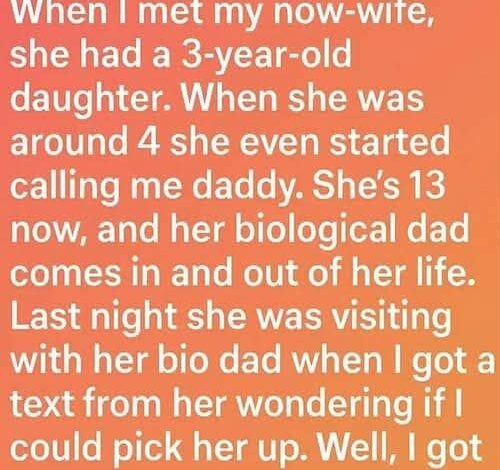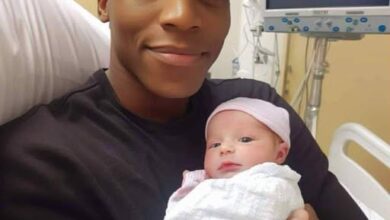
Chosen by Love! How Consistency Built Our Father-Daughter Bond!
When I first met her, I wasn’t sure what role I’d play in her life. She was three, shy but curious, with big eyes that studied everything and everyone. I wasn’t her biological father — just her mom’s new partner trying to find his place. I didn’t want to overstep, but I also didn’t want to be a ghost in her story.
The truth is, kids don’t care about labels. They care about presence. About who shows up, who listens, who keeps their word.
The first time she called me “Daddy,” she was four. We were at the park, and she tripped running toward the swings. I rushed over, ready to patch up her scraped knee, when she reached for my hand and said it so naturally — “Daddy, it hurts.”
For a second, I froze. It wasn’t a title I had asked for, and I wasn’t sure I deserved it. But in that small, quiet moment, she gave it to me anyway. Not because of blood, but because of trust.
That single word changed me. It made me realize something that no one teaches you about love: biology might bring you into the world, but consistency — the simple act of showing up — is what earns you a place in someone’s heart.
Nine years later, she’s thirteen now. Still funny, still stubborn, but sharper — testing her edges like all teenagers do. I’ve watched her grow from a little girl who needed my help tying her shoes to a young woman who debates politics at dinner and rolls her eyes when I remind her to do homework.
But behind her strength, there’s a quiet ache. Her biological father drifts in and out of her life like weather — unpredictable, sometimes bright, mostly distant. He calls occasionally, promises big things, then disappears again. She’s learned not to expect much. She hides it well, but I can see it. The way she changes the subject when someone asks about her “real dad.” The way she stiffens when his name pops up on her phone.
You can’t fix that kind of wound. You can only be there when it hurts.
One night, I was watching a game on TV when my phone buzzed. It was a text from her:
Can you pick me up?
No explanation. No emoji. Just five words.
I didn’t hesitate. I grabbed my keys and left.
When I got there, she was standing under a streetlight outside her friend’s house, backpack at her feet. She wasn’t crying, but her eyes were red. She climbed into the car without saying a word.
We drove in silence for a few minutes. I didn’t ask questions. Sometimes, kids don’t need you to talk — they just need you to be steady.
Finally, she whispered, “Thanks for always coming.”
Two words stood out: always coming.
That hit harder than anything she could’ve said. It wasn’t about that night. It was about every other night — every ride, every call answered, every moment she needed someone and I showed up. That’s what she was really thanking me for.
Fatherhood isn’t about DNA. It’s about repetition. About choosing someone, every day, in a hundred small, invisible ways.
After I dropped her off, I sat in the car for a while, staring at the house lights through the windshield. I thought about how strange it is — how love finds you not through obligation, but through choice.
She didn’t have to choose me. But she did.
And I didn’t just choose her once when I started dating her mom. I choose her every time I pick up the phone, every time I listen, every time I remind her she’s not alone — even when she’s angry, even when she slams the door and says I don’t understand.
That’s the thing about raising a child who isn’t biologically yours: at first, you wonder if you’re an outsider in someone else’s story. But over time, you realize you’ve been writing new chapters together all along.
Our bond isn’t built on grand gestures — it’s built on the small, consistent ones. Sunday morning pancakes. Late-night drives with terrible music. Sitting side by side in silence when words don’t help. The little rituals that, together, say: You matter. I’m not going anywhere.
People sometimes ask if it feels strange, raising a child that isn’t “mine.” I tell them the truth — no, it doesn’t. Because the moment she trusted me enough to reach out her hand and call me “Daddy,” she became mine in every way that counts.
I’ve learned that family isn’t made by bloodlines, it’s made by presence. Real love isn’t a one-time vow — it’s the quiet, daily decision to stay.
A few weeks ago, she asked if she could borrow the car when she turns sixteen. I laughed and said, “We’ll talk about that when you learn to parallel park.” She rolled her eyes, but smiled — the kind of smile that says she knows the answer might be “no,” but the love behind it is always “yes.”
Before she came into my life, I thought being a man meant providing, achieving, performing. Now I know it’s simpler than that. It’s about being dependable. It’s about being the one they call when things fall apart — and showing up, every single time.
That night in the car, when she said, “Thanks for always coming,” I realized she wasn’t just talking about the drive home. She was talking about the years — the birthdays, the scraped knees, the late-night talks, the ordinary moments that built something unbreakable.
Love doesn’t announce itself. It doesn’t need to. It’s built quietly, in all the times you keep showing up even when it would be easier not to.
I’m not her biological father. But I’m her dad. The man who comes when she calls. The one she trusts to be there. And I wouldn’t trade that for anything.
Because at the end of the day, being a father isn’t about creating life. It’s about sustaining it — emotionally, consistently, without condition.
She chose me. I chose her. And that choice — made again and again — is what love really looks like.
Not perfect. Not planned. But steady.
The kind that always, always shows up.




